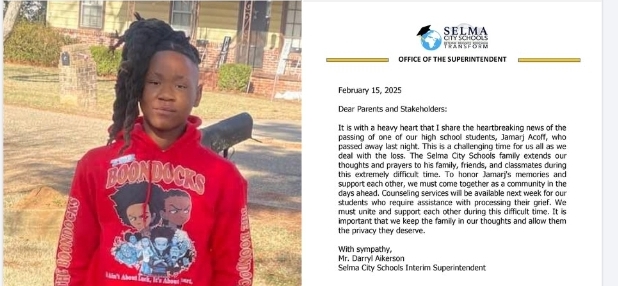
In the quiet, early morning hours of Saturday in Selma, Alabama, a tragedy unfolded that has left a community in mourning and searching for answers. Jamarj Acoff, a 14-year-old student, was fatally shot, marking a somber moment for the city known for its rich history in civil rights.
The incident occurred around 1:55 a.m. on Weaver Street, where police were dispatched following reports of gunfire. Upon arrival, officers found Jamarj, who was pronounced dead at the scene, adding a grim chapter to Selma’s narrative. The loss of a young life in this manner has sent shockwaves through the community, prompting an immediate response from local law enforcement and educational institutions.
Selma City Schools, in a heartfelt statement released later that evening, confirmed the identity of the victim, expressing profound sadness over the loss of one of their own. Jamarj, described by those who knew him as a vibrant and promising student, was remembered by the school district with words of condolence and an offer of counseling services for students and staff upon their return to school on Monday.
In response to this act of violence, the Selma Police, under the leadership of Chief Kenta Fulford, acted swiftly. By Saturday afternoon, a 17-year-old suspect was apprehended in connection with Jamarj’s murder. The minor, whose identity remains protected due to legal constraints, is currently detained without bond at the Perry County Detention Center, awaiting a judicial hearing. This arrest, while providing some measure of action, leaves many questions unanswered, particularly regarding the motive behind such a young life being taken.
As of now, the motive for this shooting remains a mystery, adding layers of complexity to an already heart-wrenching situation. The absence of a clear reason behind the act fuels speculation and concern among residents about the safety of their community, particularly for the youth. This incident does not stand in isolation but reflects a broader narrative of gun violence affecting American cities, where even Selma, with its historical significance, is not immune.
The community’s response has been one of unity and urgency in seeking justice for Jamarj. Discussions are already underway about how to address youth violence, with community leaders, educators, and law enforcement looking for ways to foster safer environments for young people. Grief counselors are being made available, highlighting the immediate need to support those directly affected by this tragic event.
The implications of this shooting extend beyond the immediate grief, prompting a broader conversation about gun control, youth engagement, and community policing. Selma, a city that has witnessed the march for civil rights, now faces the challenge of advocating for the rights of its children to live free from the threat of violence.
This event serves as a stark reminder of the fragility of peace within communities and the urgent need for collective action to prevent future tragedies. As Selma mourns, it also stands at a crossroads, where the memory of Jamarj Acoff might inspire changes that could safeguard the future of its youth. The story of this young life cut short is not just one of loss but a call to action for a city with a legacy of resilience and change.